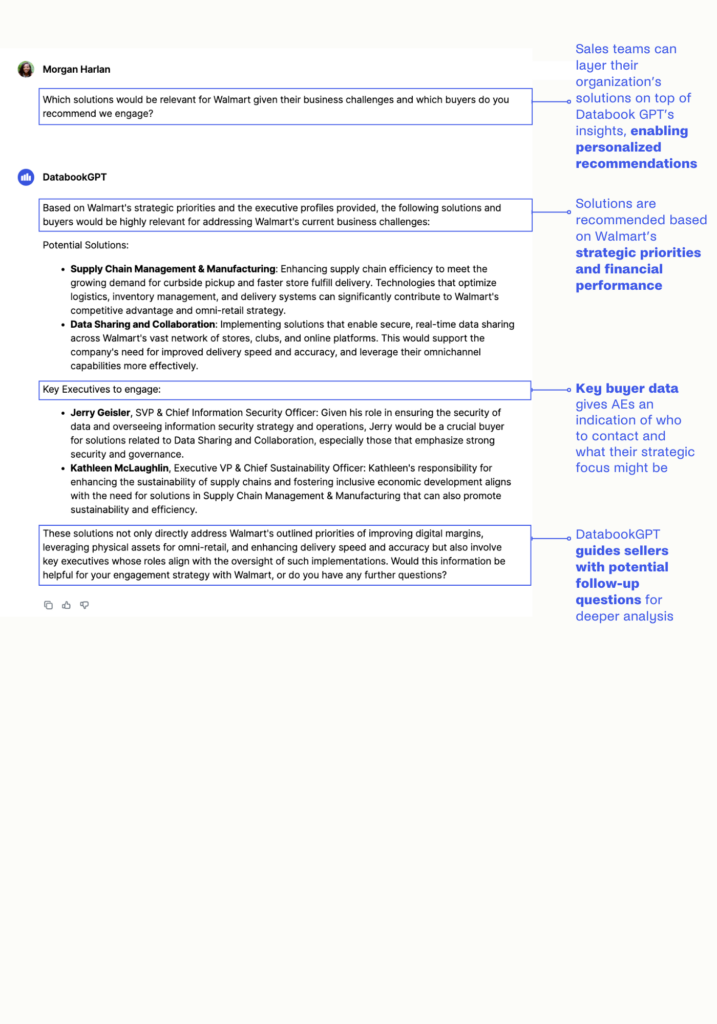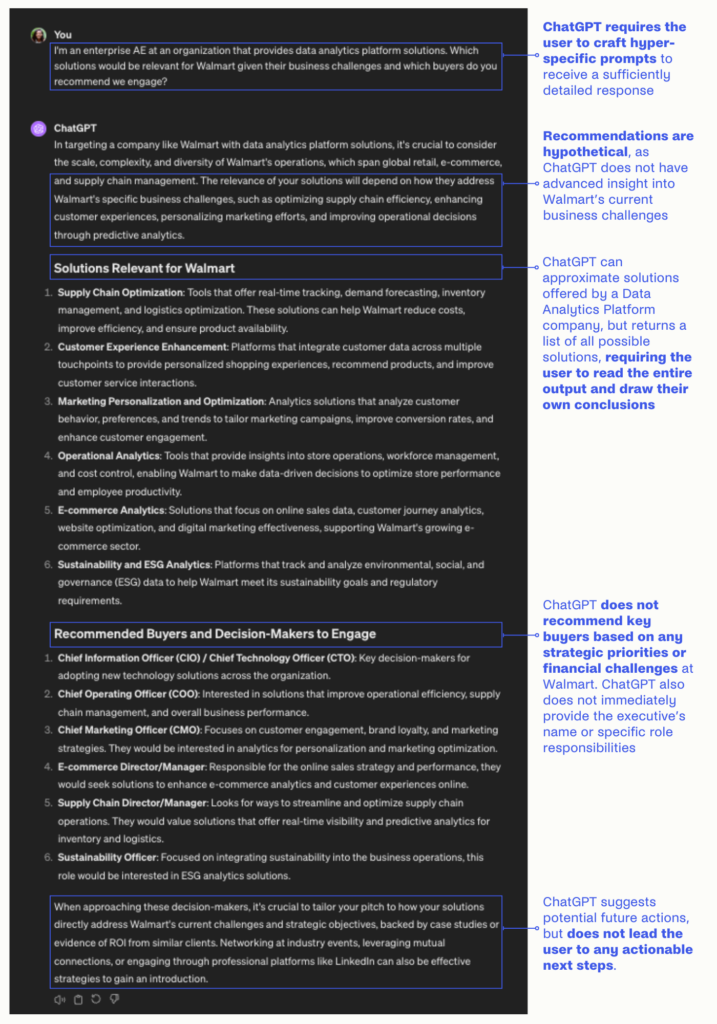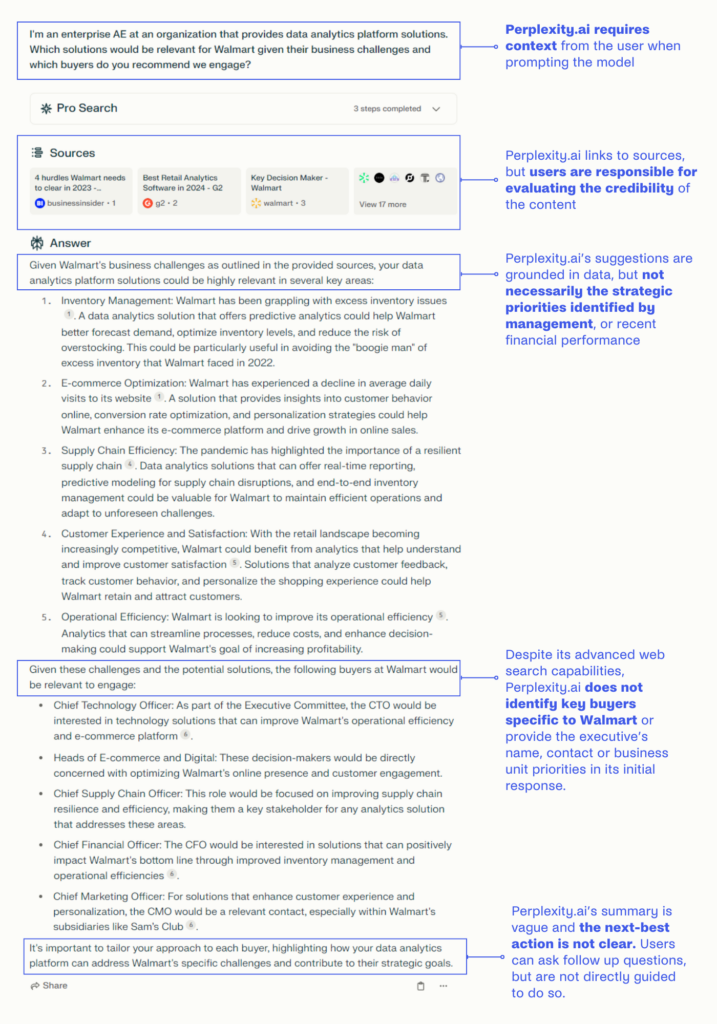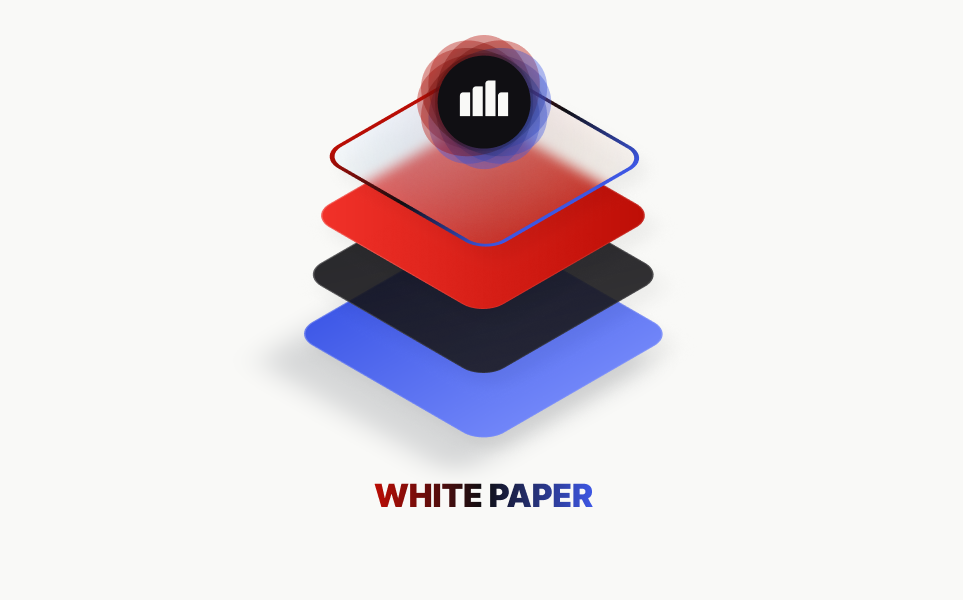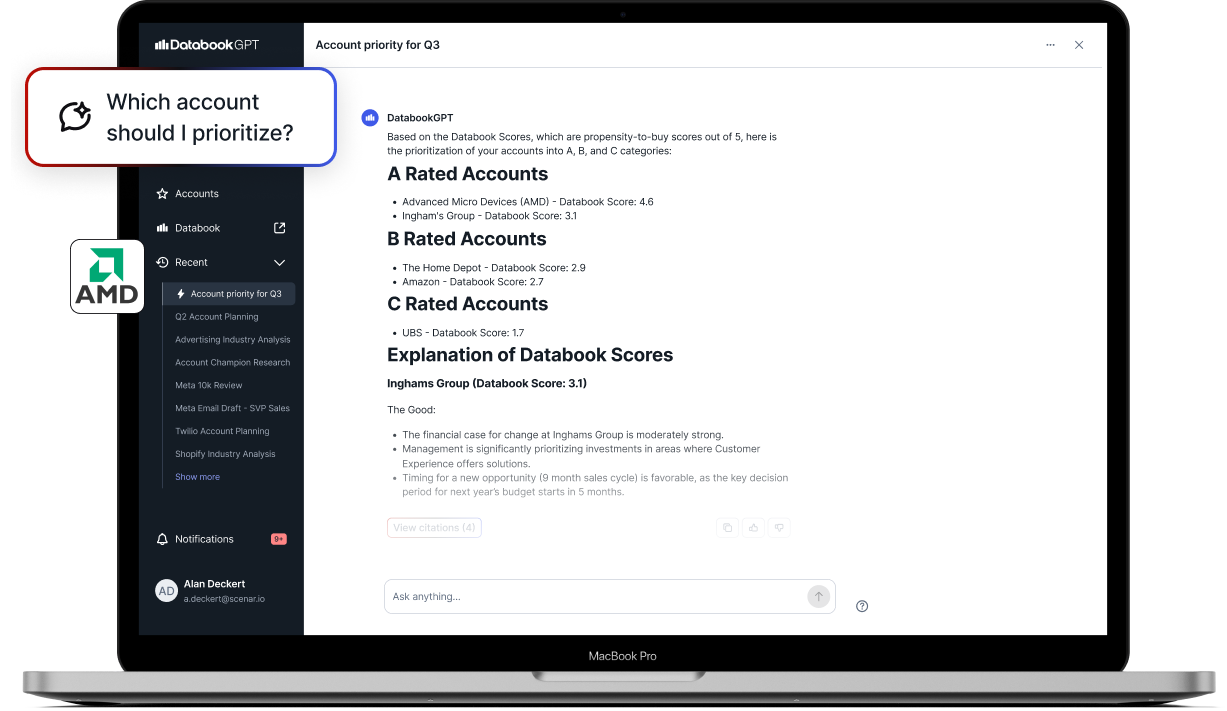Reading Time: 5 minutes
How Does DatabookGPT Compare to Other AI Tools?
Morgan Harlan

DatabookGPT is revolutionizing enterprise sales as a conversational AI sales advisor, purpose-built to supercharge enterprise sales workflows and drive productivity for sales teams.
But how does it stack up against established tools like ChatGPT and Perplexity.ai? Let's delve into the comparisons.
What is DatabookGPT?
DatabookGPT is a conversational AI-driven sales advisor that taps into Databook’s vast array of real-time data pulled from trusted sources like Capital IQ, leading news providers, and SEC Filings.
Our cutting-edge generative AI technology then simplifies and synthesizes complex data into clear, actionable account intelligence, streamlining enterprise sellers' workflows and boosting productivity.
DatabookGPT is built specifically to ensure that your sales team always has the data they need at their fingertips to make more informed decisions and close more deals.
The Databook advantage
Deep Domain Expertise
Databook leverages decades of value selling experience and patented models to offer actionable intelligence that enables strategic selling across all key sales moments.
Trusted Accuracy
We ground our answers in real-time, proprietary datasets to create trusted narratives. We also include Human-in-the-Loop moderation to ensure only current, accurate and factual information is shared with the user.
Privacy & Security
We offer a 100% secure, trusted, and private experience built on AWS. Our business is SOC2, GDPR, and CCPA compliant with integrations to Salesforce, Slack, and Microsoft ecosystems.
Model Customization
DatabookGPT can be customized to an enterprise’s specific solutions, case studies, sales presentations, and more. Not only does this save sellers time in having to craft highly specific prompts, but it helps sales leaders ensure fast onboarding and consistency across the entire sales team.
Proactive Nudges
As a truly unique advantage, DatabookGPT delivers proactive nudges alerting sellers to account changes or guiding them to continue making progress on deals that might have gone quiet. These signals are sent directly to the places where sellers work, like Slack or Teams. It's basically “Intelligence as a Service,” providing trusted narratives when sellers need them most.
See how we compare to other leading conversational AI tools
We looked at how DatabookGPT stacks up against popular conversational AI agents that sellers are using today.
DatabookGPT stands out among AI tools with its unparalleled ability to provide tailored and actionable insights for a diverse range of users. Unlike other AI models that require hyper-specific prompts or lack contextual understanding, DatabookGPT empowers users with personalized recommendations effortlessly.
We evaluated core features and functionalities across the following dimensions: target audience, accuracy, privacy & security standards, model customization abilities, and available integrations.
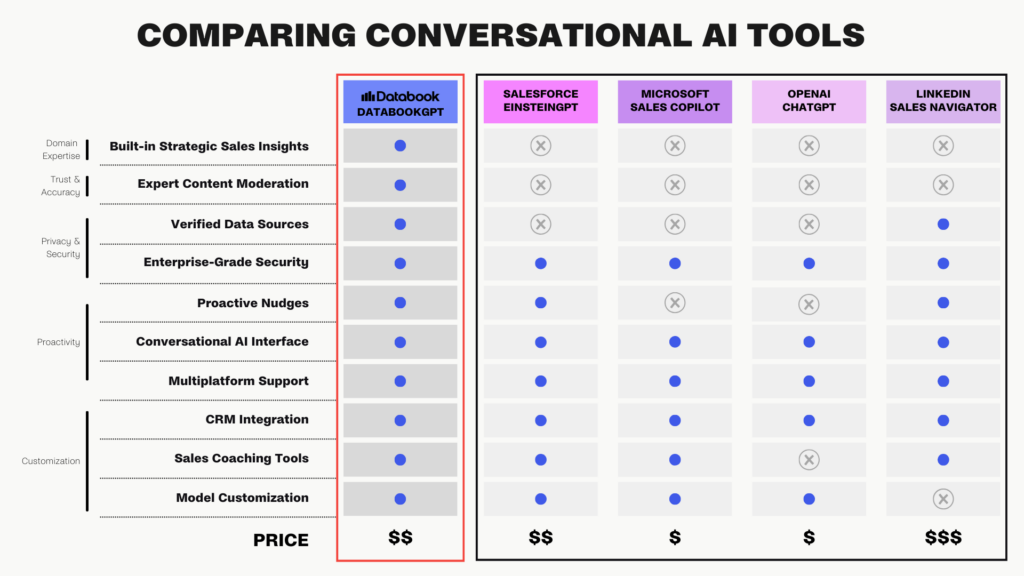 DatabookGPT ensures that recommendations are not just hypothetical but deeply grounded in real-world data. With DatabookGPT, users receive not only insightful recommendations but also clear pathways for meaningful action, making it the ultimate choice for those seeking unparalleled AI-driven solutions.
DatabookGPT ensures that recommendations are not just hypothetical but deeply grounded in real-world data. With DatabookGPT, users receive not only insightful recommendations but also clear pathways for meaningful action, making it the ultimate choice for those seeking unparalleled AI-driven solutions.
What about output? How does DatabookGPT compare?
DatabookGPT
I started by asking DatabookGPT to help me align my solutions to a specific account as I worked out an account strategy. Prompting was simple, as DatabookGPT is already familiar with what I sell within the context of its deep industry expertise. For enterprises with model customization, DatabookGPT can be programmed to know exact offerings and use cases to make prompting even faster and easier.
Key Takeaways:
- Personalized recommendations: Sales teams can layer their organization's solutions, case studies, and team objectives to get tailored recommendations for engaging with Walmart.
- Strategic alignment: Recommendations also consider Walmart’s strategic priorities and financial performance to ensure that sellers are crafting narratives that will resonate with the C-Suite.
- Buyer insights: Key buyer data aids Account Executives in targeting the right contacts and understanding their strategic focus.
- Enhanced guidance: Databook GPT provides potential follow-up questions to facilitate deeper analysis during sales interactions.
ChatGPT
ChatGPT is often the easy go-to for many sellers since it offers a free tier, but as the old adage goes, sometimes you get what you (don't) pay for. Here I took the same prompt concept as with DatabookGPT but, as you can see, ran into a few snags.
Key Takeaways:
- Prompt specificity: Users must create highly detailed prompts for ChatGPT to provide sufficiently detailed responses.
- Hypothetical recommendations: ChatGPT lacks advanced insight into Walmart's current business challenges, resulting in hypothetical recommendations.
- Comprehensive but manual analysis: While ChatGPT can approximate solutions by industry, the user must manually match the output to their organization’s actual use cases.
- Lack of strategic alignment: ChatGPT does not recommend key buyers based on Walmart's strategic priorities or financial challenges, nor does it provide executive details.
- Limited actionable guidance: ChatGPT suggests potential future actions but lacks clear, actionable next steps for users.
Perplexity.ai
Perplexity.ai is getting a lot of attention these days as the potential future replacement for Google. The idea is that Perplexity steps up the typical Google search by delivering insights along with source citations, which is supposed to simplify the search process while instilling greater trust in the output. Unfortunately, I still found the output lacking in comparison to DatabookGPT. Here's why.
Key Takeaways:
- Contextual prompting: Users must provide context to Perplexity.ai when prompting the model for responses.
- Source evaluation: Perplexity.ai links to sources, but users must assess the credibility of the content themselves.
- Data-driven suggestions: Perplexity.ai's recommendations are based on data but may not align with management's strategic priorities or recent financial performance.
- Limited buyer insights: Despite advanced web search capabilities, Perplexity.ai does not identify key buyers specific to Walmart or provide executive details initially.
- Vague summaries and lack of guidance: Perplexity.ai's summaries may be vague, and the next-best action is not clear. Users can ask follow-up questions but aren't directly guided to do so.
Sellers simply need more
While these comparisons are just a quick look at what's possible (or not possible) with today's commonly used conversational AI tools, one thing is clear: Enterprise sellers can clearly get more depth and strategy from an AI sales advisor that's purpose-built with domain expertise centered on their needs. DatabookGPT also reduces the complexity of prompting the tool with baseline information, which saves time while increasing the effectiveness and relevance of the output delivered. Add in the ability to guide a seller to next steps, or even proactively prompt a seller to stay updated and take new action, and DatabookGPT emerges a clear winner.
If you're interested in learning more and trying DatabookGPT yourself, make sure you request a demo.
